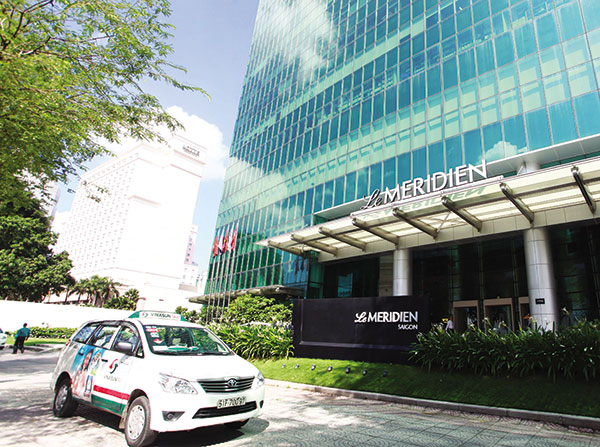Influx of local travellers feeds vital hotel market
 |
| With tourist numbers trending upward, the hotel sector is attracting ample investment, Photo: Le Toan |
General manager of Pullman Saigon Central Tony Chisholm said that Accor Hotels has plans to increase its current footprint of 26 hotels to 40-45 hotels by the end of 2019, half of which will be situated in resort locations.
“We are changing our strategy to attract middle-income Vietnamese into our hotels. With rising disposable incomes, Vietnamese are increasingly choosing upscale hotels to experience international service and quality. Local tourists are now our third-ranking market segment, something we never thought would be possible 10 years ago,” Chisholm said.
Tao Quang Nghe, chairman of Odyssea Hospitality, said that there is a growing trend among domestic guests to stay at upscale local and international hotels. For example, Muong Thanh Group has attracted many Vietnamese guests to their premium hotels. In addition, Vietnam is striving to turn the tourism sector into an economic spearhead by attracting an estimated 20 million international tourists by 2020. More international hotel operators are expanding their presence in Vietnam, which is a positive sign for the development of tourism in the country.
Last year, the Vietnamese tourism industry rode an all-time-high wave, with a 26 per cent year-on-year increase in total foreign visitor arrivals and an 18.4 per cent rise in total revenue. Localities nationwide welcomed 72 million domestic and international visitors, higher than the target of 68.5 million visitors set by the Vietnam National Administration of Tourism.
To accommodate the increasing number of arrivals, new hotels have been popping up across the country. Over 8,700 rooms from 41 new three- to five-star hotels came into operation in 2016, increasing the total number of rooms to over 420,000 – much higher than the number of rooms in neighbouring countries like Malaysia, Laos, and Cambodia, according to Grant Thornton Vietnam’s Hotel Survey 2017.
The executive chairman of Grant Thornton Vietnam, Kenneth Atkinson, said that merger-and-acquisition activity is buzzing in the hotel sector, with deals such as Van Thinh Phat’s acquisition of the Duxton Hotel Saigon – now the Saigon Prince Hotel. There are also many more potential transactions in Nha Trang, Phu Quoc, Cam Ranh, and Danang. Grant Thornton is currently advising three groups on potential acquisitions.
Atkinson added that most of the new brands planning to enter Vietnam will choose glamour cities. Their favourite properties are four- and five-star hotels in Hanoi and Ho Chi Minh City. “In the time to come, we expect to see more deals, as firms often underestimate the amount of capital needed to develop and run a profitable international standard hotel.”
Echoing this view, the general manager of Caravelle Saigon, John Gardner, told VIR that foreign investors are looking for good hotels in prime locations, especially three- to five-star hotels. They are also looking for owners and managers who understand the hotel industry.
“In fact, there were a lot of problems between owners and operators in the past due to the lack of understanding of international business standards. Vietnamese hoteliers are getting more experienced when they integrate into the international market, which becomes one of the most important criteria apart from location,” he said.
According to real estate consultancy firm JLL, hotel investors are keen to capitalise on the Vietnamese market. 2016 saw record levels of hotel transactions, with the dollar value of deals completed during the year representing 83 per cent of that of the deals completed in Thailand, a market which is often perceived to be significantly larger and more liquid.
Frank Sorgiovanni, head of Research Asia Pacific at JLL Hotels and Hospitality Group, said, “Opportunities to acquire hotels in many gateway Asian destinations is limited, and investors continue to seek alternative investment in emerging markets such as Vietnam or Cambodia, where arrivals growth is strongly supported by Chinese tourism.”
“We remain particularly bullish about Vietnam's growing tourism and thriving economy, which has foreign investors from across the region attracted to its hotel and resort market over the past 18 months. The country has become one of the most talked-about markets in Asia Pacific,” he added.
What the stars mean:
★ Poor ★ ★ Promising ★★★ Good ★★★★ Very good ★★★★★ Exceptional
Latest News
More News
- Tides of Heritage: A Tet speciality at InterContinental Phu Quoc Long Beach (January 20, 2026 | 12:08)
- Muong Thanh launches Lunar New Year gifts inspired by tradition (January 16, 2026 | 16:41)
- The Grand Ho Tram seeks responsible entertainment with pilot casino access (January 16, 2026 | 10:56)
- Ocean Resort by Fusion Quy Nhon launches Lunar New Year 2026 package (January 15, 2026 | 11:11)
- Regent Phu Quoc announces general manager appointment (January 15, 2026 | 11:06)
- Fusion to debut two landmark hotels in early 2026 (December 26, 2025 | 11:46)
- Pan Pacific Hanoi unveils festive season of light and music (December 15, 2025 | 18:22)
- JW Marriott Hotel & Suites Saigon unveils festive initiatives (December 12, 2025 | 15:12)
- Festive magic by nature unfolds at JW Marriott Cam Ranh Bay Resort & Spa (December 11, 2025 | 18:17)
- The Reverie Saigon presents festive programme (December 11, 2025 | 18:15)
















 Mobile Version
Mobile Version